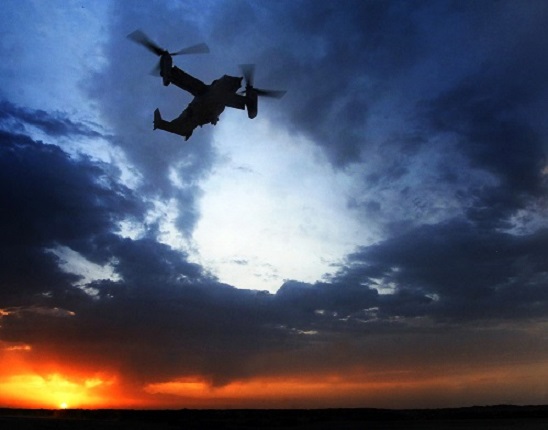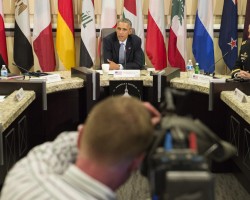
A Dangerously Confused AUMF Discussion in Congress as Escalation Looms
A Dangerously Confused AUMF Discussion in Congress as Escalation Looms
March 13, 2015
Earlier this week, top officials appeared before the Senate Foreign Relations Committee to discuss the Obama Administration’s proposed authorization for use of military force (AUMF) against the Islamic State. Secretary of Defense Ashton Carter, Secretary of State John Kerry, and Chairman of the Joint Chiefs of Staff Gen. Martin Dempsey took part in a conversation that highlighted several areas of concern for which additional focus is warranted going forward. In particular, the hearing added confusion to the proposed definition of “associated forces” and how it is currently interpreted or could be interpreted in the future. The hearing also confirmed the proposed language that would prohibit “enduring offensive ground combat operations” lacks significant meaning. The discussion highlighted that the Administration is increasingly comfortable relying on 2001 AUMF authority to prosecute the war and that they believe they could revert to 2001 authority should an Islamic State-specific authorization expire. Finally, back-and-forth during the hearing and related statements by top Republican senators indicate there is a real chance that the war against the Islamic State could escalate to taking action against Bashar al-Assad – and that some Republicans want to put the authority to do that in the AUMF.
It is becoming less clear how the term “associated forces” as defined in the proposed AUMF would be interpreted and used. The hearing focused heavily on what constitutes an “associated force,” but unfortunately the discussion created more confusion than clarity.
Do ISIL “wannabes” count as “associated forces?” In response to a question regarding attacking ISIL associated forces in Libya, Secretary Carter implied targeting “wannabes” was part of the reason for the kind of associated forces language contained in the bill: “But you do see in this social media-fueled movement called ISIL, people who are wannabes or want to join or have been associated with al-Qaeda or some other group who are putting up the flag of ISIL. And we need to recognize that that’s a characteristic of the campaign and that’s why the AUMF has the [associated forces] language that it does.” [Ash Carter via Ryan Goodman, 3/12/15]
Do ISIL affiliates have to attack the United States or coalition partners to count as “associated forces?” Ryan Goodman, professor at NYU School of Law, adds: “That said, Mr. Kerry did refer to the affiliate ‘join[ing] with ISIL in a specific strategy to attack coalition partners [or the United States as part of the idea of associated forces]’… Still, Kerry did not, by any stretch, stipulate that phrase is an essential requirement of the test of associated forces. Indeed, it is likely not a minimum condition of the test since to ‘join…a specific strategy to attack’ is likely [a higher]…threshold than the administration would even apply to al-Qaeda under the existing co-belligerency standard [used to determined associated forces]. Kerry was more likely using the phrase by way of example – not setting an outer limit.” Adding to the confusion, Gen. Dempsey used a lower standard, saying an affiliated group only had to “threaten U.S. interests” to qualify as an associated force. [Ryan Goodman, 3/12/15. Marin Dempsey, 3/11/15]
What ISIL-affiliated groups would count as associated forces? This was a direct question that went unasked and unanswered. When specific groups like Boko Haram were discussed, however, it was unclear how various interpretations of “associated forces” would apply. At one point, Secretary Carter said associated forces language “can be interpreted, but has not yet been interpreted, to cover other groups like Boko Haram.” [Ash Carter via Slate, 3/12/15]
The Administration’s proposed AUMF’s prohibition on “enduring offensive ground combat operations” is being shown to have no significant meaning. Previously, national security and legal experts have explained the term has no military or legal meaning. That was confirmed during the hearing when Gen. Dempsey said the term was not drawn from military doctrine and no precise meaning was offered by other witnesses. Instead, Secretaries Carter and Kerry repeatedly resorted to explaining the way they “contemplated” the term to mean prohibiting operations smaller in scale than those seen in Iraq and Afghanistan. What would be allowed under their current interpretation of the term short of Iraq- or Afghanistan-like operations is undefined. Moreover, the interpretation of the next Administration cannot be predicted – and certainly won’t be significantly legally constrained by the current proposal if it becomes law.
As it stands now, the Administration’s proposed AUMF allows reverting back to the 2001 AUMF and potentially ignoring the limits in any Islamic State-focused authorization. The Administration is increasingly brazen in its claim that the 2001 authorization applies to the Islamic State and that it doesn’t technically need any additional authority. Secretary Kerry said, “We‘re convinced we have the authority. That’s not the issue here.” But that belief does in fact pose a problem. Heather Brandon of Human Rights First explains, “Carter…said that if the ISIL AUMF was not reauthorized after three years, a future president could continue to target ISIL under the 2001 AUMF – and consequently, without the limits in the ISIL AUMF. This effectively renders the ISIL AUMF debate absurd.” A potential solution is to add to the proposal a so-called “supersession clause” that either says an ISIL-only AUMF supersedes the 2001 authority in application to the Islamic State – as recommended by a coalition of national security law organizations – or a provision that explicitly states the 2001 AUMF does not apply to the Islamic State. [John Kerry via UPI, 3/11/15. Heather Brandon, 3/12/15]
Key Republican senators are angling for the AUMF to authorize going after the Assad regime – and the military strategy may be shifting in that direction. Sen. Lindsey Graham (R-SC) said he won’t support an AUMF that does not apply to Assad. “Any authorization to use force that will not allow us to neutralize the air threats that any group going into Syria [such as moderate Syrian opposition elements the U.S. intends to train and equip] would face from Assad is not only militarily unsound, it is immoral,” he said. Sen. Bob Corker (R-TN) has voiced similar concerns. Gen. Dempsey agreed in the hearing that successfully training and equipping moderate Syrian opposition to allegedly fight the Islamic State might require some kind of support against Assad’s forces. “We’re under active discussion about whether and how to support them,” he said.
Taken together, these factors indicate it is becoming increasingly possible for the war against the Islamic State to escalate to a war also intended topple Assad’s regime, something with very different risks, as NSN has pointed out previously. [Lindsey Graham and Martin Dempsey via The Hill, 3/12/15]
Photo Credit: A Royal Netherlands Air Force F-16 Fighting Falcon receives fuel from a U.S. Air Force KC-135 Stratotanker over Iraq. The F-16 is striking ISIS targets in support of Operation Inherent Resolve [U.S. Air Force photo by Staff Sgt. Perry Alston, 3/10/2015]





![U.S. Senator Tom Cotton speaks at the 2015 CPAC Conference [Gage Skidmore, 2/26/2015]](/cms/assets/uploads/2015/03/3.9.2015_Daily-Photo-Cotton-e1426004331273-140x140.jpg)
